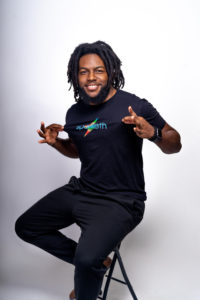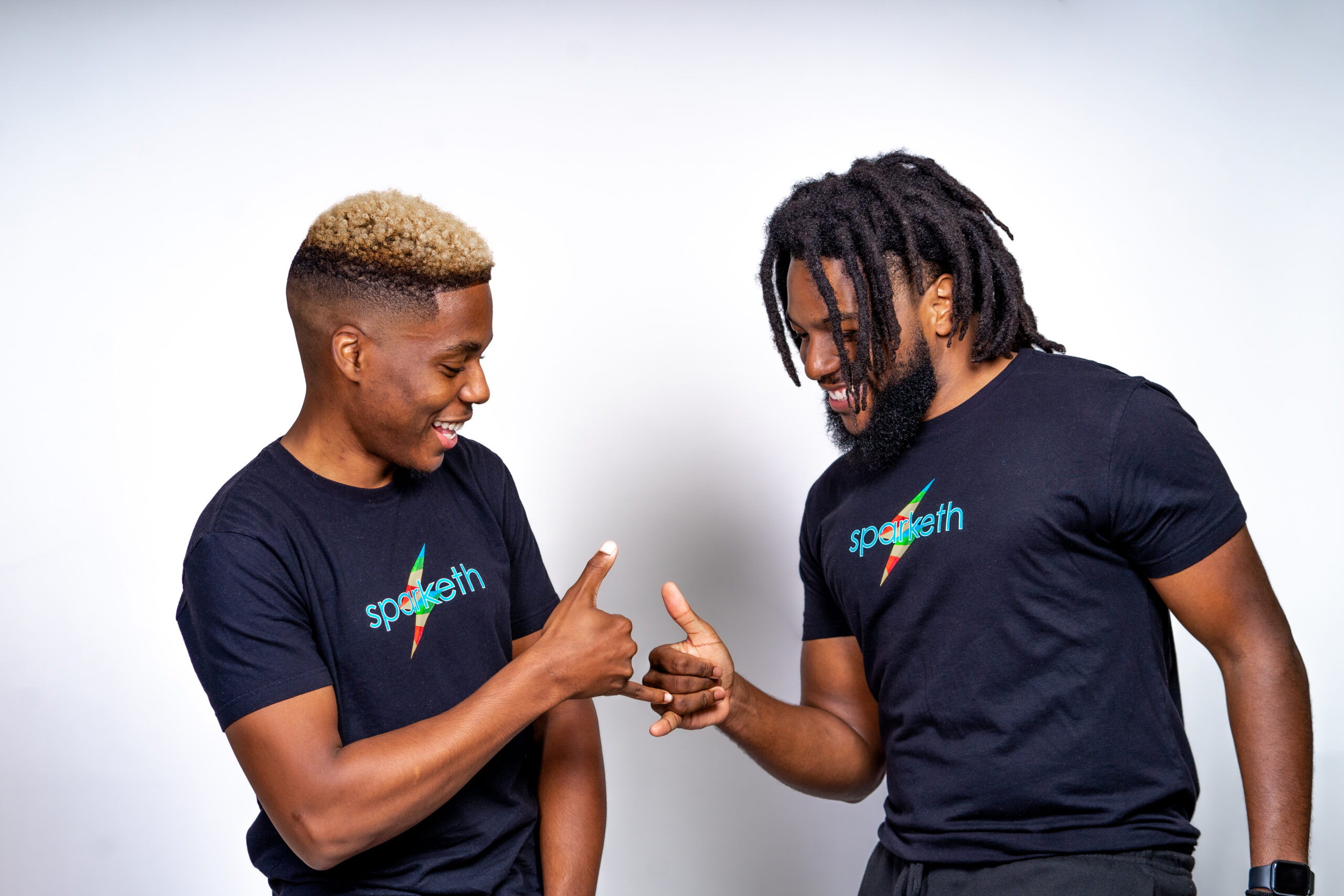In 2015, two best friends – Dwayne Walker and Tim Samuel- decided to drop out of college in order to chase after their dream: an online arts education company called Sparketh. They had a passion for entrepreneurship, collective skills that uniquely fit their vision, and a thirst for learning about the the various facets of starting a company. They were also motivated by a love of all things creative. Sparketh was founded on the belief that all kids deserve more creativity in their lives– specifically through access to affordable, high-quality art education. While they started out small as a team of two, Tim and Dwayne worked nonstop to grow their initial vision. Over the past few years, Sparketh has continued to grow—adding increasing numbers of art classes, students, and members to the Sparketh team.
This year (2021) on October 22, the two best friends and co-founders of Sparketh crossed an exciting and rare milestone–they were featured on the hit show, Shark Tank. If you missed the live episode, just skip over the next paragraph… and photos (spoiler alert!)
Sidenote: If you haven’t seen it yet, you can watch Sparketh’s Shark Tank episode on Hulu. It’s the third episode of the current season (13).
Sparketh’s dynamic duo wowed the judges with their vision, their enthusiasm, and their presentation. Ultimately, they scored a “double shark deal,” with Barbara Corcoran (“The Queen of Real Estate”) and Daniel Lubetzsky, guest shark and founder/executive chairman of the KIND empire. However, Sparketh’s deal had a contingency. Barbara and Daniel decided to invest $100, 000 in exchange for 20% of Sparketh… but only if Dwayne and Tim can show proof of profitability in six months. The clock is ticking!

As a member of the Sparketh team, I was eager to hear from Tim and Dwayne about what it was like to be on Shark Tank. In the following Q & A, we talked about their Shark Tank experience, their evolving vision for Sparketh, and why these co-founders think that creativity is one of the most valuable qualities someone can possess.
On the Shark Tank Experience
How long have you watched Shark Tank and when did you know you wanted to go on the show?
Dwayne: I’ve been watching the show for over a decade–since I was a kid really. So I’ve pretty much always thought it would be cool to be on it. We started the process of applying to be on Shark Tank last spring. There was a lot involved in the process in terms of submitting tapes and videos and paperwork, but it was all part of the journey.
What was the actual experience of being on Shark Tank like?
Dwayne: Well, first of all, what you see on TV was like a 10-15 minute feature, but in reality we were in there for about 50 minutes. We talked to the sharks a lot more than you got to see on the episode and went into much more depth about Sparketh. The Shark Tank room is also really big. I don’t know if it was more spread out than usual because of Covid protocols, but it is huge. Another thing I wanted to mention is that, even though Tim was like in power pose during the whole presentation, he wasn’t feeling well at all that weekend. He was feeling pretty bad that whole day and then pulled himself together right before going into the tank and stuck it out.
Tim: But something pretty funny did happen right in the middle of our pitch. One second we were talking, and then someone yelled, “Stop!” The cameras stopped. The Sharks stopped. We stopped talking. Then someone from the crew just walked up to me and whispered in my ear, “Here, take this.” They handed me a folded up paper towel and said, “You’re sweating.” They dabbed my face, walked off, and said, “Continue.” Then everything just went back like it never happened. If you watch closely, I think you can see where I have a big bead of sweat on my forehead one minute and then it’s suddenly gone in the next shot.
Did you get the sharks you were expecting to get? Who were you expecting to be interested?
Dwayne: Before we walked in there, we’d already thought through how each one of the sharks could bring something unique or valuable, either from their audience or their unique expertise. We kind of went in with an open mind.
What was it like to watch your pitch on TV for the first time alongside friends and family?
Tim: It was very surreal and very funny. There was such a disconnect watching it on the screen. I kept thinking, “That wasn’t me,” or “That’s funny that Dwayne was looking like that.” We’d spent a lot of time beforehand trying to guess what story they would tell or what moments the editors would choose to pause on, so it was also really interesting to see which moments from the discussion were highlighted.
Dwayne: I don’t really know what I expected it to feel like watching it because I was running around right up until it aired, but it was actually hilarious. I watched it sitting next to Tim and there were so many moments we were just laughing. I really didn’t recognize myself. And honestly, hats off to the editors too. Even though I knew the outcome, my heart was beating and I was feeling the suspense and the intensity– seeing the sweat and hearing all the little sound effects. Watching it with friends and family was awesome–the energy in the room was great. Everyone was super hyped.

Aside from getting a potential deal with 2 sharks, what was the most meaningful thing you’ve taken away from your Shark Tank experience?
Tim: It’s such an awesome opportunity for any entrepreneur to go into the Shark Tank, especially if you’re bootstrap like we have been. It gives credibility – not just to your business- but to you as an entrepreneur. It’s empowering to have such successful and powerful business people see and acknowledge the value in your business. Even without any investment, their feedback alone is so valuable. Sparketh has been a long-term project for us that has never really paid us anything significant or anything like that. But once we saw that these successful people were willing to invest in it, it really made it click for us and made us realize that this is a valuable business, and we are contributing something significant to the world.
Dwayne: Absolutely agreed. As an entrepreneur, you sacrifice so much hoping that people will see your vision. It does bring validation to have someone like that believe in you.

On Sparketh
Was there one specific moment that you can remember first thinking up Sparketh?
Dwayne: There was definitely a specific moment. It was right after we entered this Shark Tank style contest called Concept2Reality at Kennesaw State University. Our business proposition at the time was called Sirius, and it was a resource for kids that would help with various subjects. Around the same time that we were pitching that idea for the contest, Tim and I were working on a completely different business concept with a group of people, which fell through due to circumstances outside of our control. Anyway, it got us thinking: what project could the two of us team up about that we would both be passionate about?
That’s when we both dedicated ourselves to this one idea. We took some things that we loved about the Sirius project and narrowed it down. Tim is really good at reverse-engineering and narrowing in on what we subject we should start with and what audience we should start with. We ended up deciding to focus on an online art education resource specifically geared towards the homeschool audience– with the goal of expanding into other creative learning, later on.
In the tank, Mark Cuban questioned what makes Sparketh different for students than just learning art on Youtube. We didn’t really get a chance to see you respond on the show, so can you respond to that now?
Dwayne: Honestly. the answer to that is twofold. Firstly yes, Youtube has tons of content, but you have to spend so much time shifting through low-quality stuff to find something that is quality. Given that, it’s hard to figure out a “path” for learning. In contrast, Sparketh is custom-built for learning. We’ve built out learning tracks that kids can follow to learn in a sequential way that builds their skills.
That leads to the second major difference, which is platform. If you remove all of the content from Youtube and Sparketh, the fact is that Youtube is built for entertainment, but Sparketh is built for education. In building Sparketh, we have created educational features that go with the video content to enhance the learning experience: worksheets, vocabulary words, and key takeaways. Also, we have a whole community aspect–which offers kids an online place to continually support each other to create!
How do you manage being best friends and business partners? What advice would you give to someone wanting to start a business with a close friend or family member?
Dwayne: In our friendship we already balance each other out, and our business relationship has really just been an extension of that. If you remove business and just observe the way we learn things together or work on little projects (or even sometimes get ourselves into stupid situations), there’s always a sense of balance there. To anyone out there wanting to start a business with a good friend, I’d suggest that you make sure there’s genuine balance in your dynamic. With us, it’s not all fun and games, but the fun and games is a great addition because he’s my best friend.
Tim: I agree! I’d also advise someone who is considering starting a business with a friend or family member to pick a business that you are both passionate about. For us, we’re both very creative in different ways. Creativity has always been something that we’re both very passionate about, so that makes Sparketh feel less like business and work all the time.
What would you like to see happen with Sparketh within the next year?
Tim: I’d love to see three more creative subjects fleshed out on the site so that kids who are creative – but maybe not into traditional art – will have creative learning resources too! That’s something we’ve always wanted to do, and I’d like to see it happen within the next year.
Dwayne: I’d also like to continue to grow our creative community of kids, and I’d love to see us building out even more progressive tracks so that kids can get into even more advanced creative skills.

On Creativity
What have you found to be the most important way that creativity and entrepreneurship overlap? What has been the most important way that creativity has impacted your business?
Tim: I think creativity has enhanced our problem-solving skills and that helps with pretty much anything. You’re always going to have problems in anything you attempt. Success really comes down to how well are you able to solve those problems, and creativity is what helps you solve those problems. As long as we continue to be creative, we will continue to get further and further along in our journeys. Being creative in the concept we developed in Sparketh, and in the way we presented it, also helped us connect with so many of the right people and families who have also helped us in this process.
Dwayne: Additionally, I think that creativity and entrepreneurship go together well because creativity is all about idea generating, and entrepreneurship is about idea implementing.

Sparketh is all about growing creative skills at home. Beyond the homeschooling space, why do you think that’s important?
Tim: Growing your creative skills at home is so important in this day and age when the world is transitioning more and more to a remote workflow. If you make creativity a part of your home routines, then your skills will grow exponentially faster than the people who only create at work or in a classroom. Growing creative skills at home is the foundation to building a life abundant with creativity.
Most people agree that the nature of the modern “job” is rapidly in flux, with new technology constantly creating new fields, and freelancers and entrepreneurs becoming more common than ever before. Can you talk about creativity’s role in all of this, especially for the upcoming generation?
Dwayne: The new soft skill that everyone is looking for is creativity, and there’s a reason for that. These new emerging jobs are essentially just new problems to solve. As Tim was saying, creativity enhances problem-solving. It also means being more open-minded and curious, able to explore not just what is “now,” but to think about what is coming up next. Being in a creative state is almost like you’re living in the future while creating the future. Creativity gives kids the right tools to be prepared for the unknown. It helps them to be open to new possibilities and gives them the mindset to be innovative…to solve the problems of the future.
What’s something that you’d like to say to people who saw you on Shark Tank or who are just curious to know more about Sparketh? Any final thoughts you’d love to share with readers?

Tim: We’re passionate about creativity and everything that has to do with creativity. I might not be the most “artsy” person, but I’m passionate about creativity and that comes through in the different things I do for Sparketh. I want to invite anyone who saw us on Shark Tank who is passionate and cares about creativity to reach out to us. If you want to be part of a creative movement for kids and teens and you love creativity – even if you’re not an amazing artist- maybe there’s some way we could chat, share ideas, or collaborate. We love meeting other creatives and people who are passionate about creativity!
Dwayne: And I also would want to say something to the kids and teens out there who are creative, but who have been beaten down by people they are around. If the school system, or the world, or anyone, has told you that you aren’t good enough or tried to shut you down, I want to tell you that there is a safe place for you at Sparketh. Sure, Tim and I are the ones you saw on Shark Tank up there doing magic tricks, but every single person behind the logo of Sparketh team embodies creativity and is here to support you. Everyone on this team inspires me personally so much, creatively! Everyone behind the face of Sparketh is here to inspire creativity in kids and teens.


